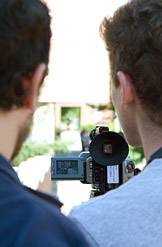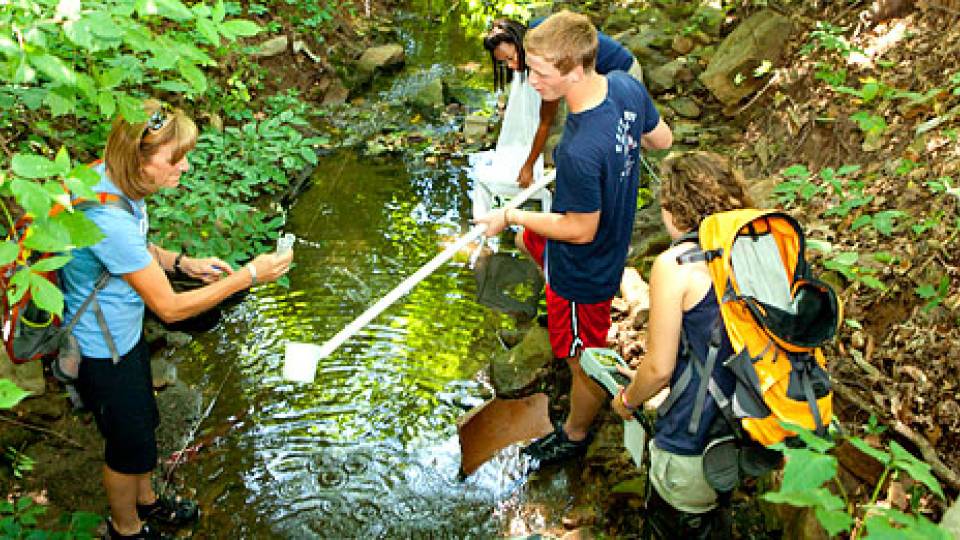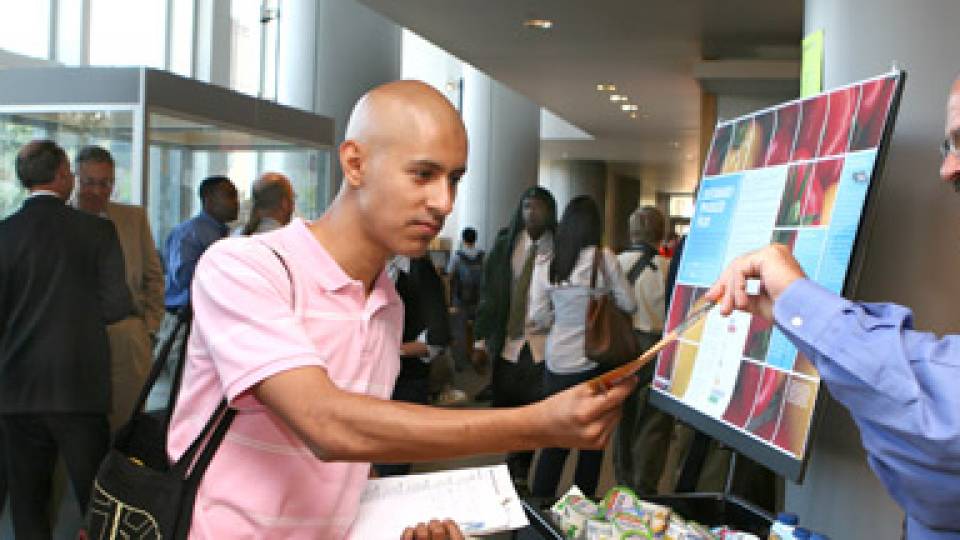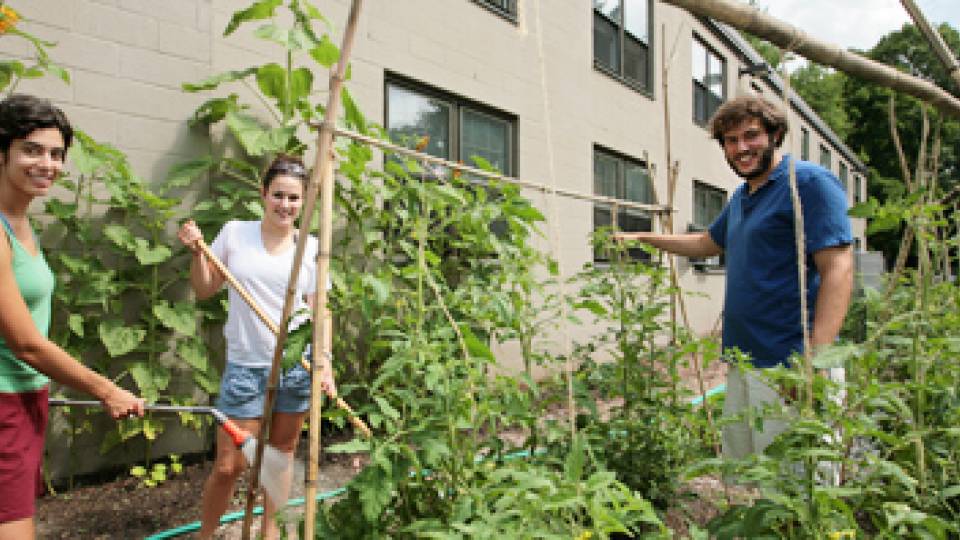Anyone strolling through Princeton's campus this fall can see, hear, touch, smell and even taste the University's ongoing sustainability efforts through a range of projects that progressed this summer.
The Office of Sustainability, working with various University departments, oversees programs that promote interactive ways to experience Princeton's achievements in conserving resources, reducing greenhouse gas emissions and promoting sustainable research and education.
"We are focused on programs that may be a community resource for everyone at the University, not just a subset of people who are interested in sustainability," Sustainability Manager Shana Weber said. "Whether someone is working in an academic building, living in a residence hall or just taking a walk outside, they have an opportunity to connect with many of the sustainable initiatives launched since the University adopted its Sustainability Plan in 2008."
While some projects bloomed best in the summer sun -- such as the Frist Campus Center herb garden -- much of the work advanced during the past few months will continue this academic year, including plans for a sustainability kiosk in Frist and the completion of energy dashboards in Frick Chemistry Laboratory and Butler College.
Sustainability projects that took place on campus this summer, as well as those that will continue this academic year, include:
• 701 Carnegie Center sustainability fair. Employees at 701 Carnegie Center kicked off the summer in June with a fair showcasing their building and the University's sustainability efforts. Staff from the Office of Finance and Treasury, Office of Information Technology, and University Services spent the afternoon of June 10 learning about sustainable solutions they could adopt in the workplace and in their homes.
Organizer Donald Weston, senior adviser to the vice president for finance and treasurer, said it was the University's first building-centered sustainability fair. He hopes other departments will be inspired to host similar events.
"It was a great way to promote sustainability within the confines of the space where we work every day," Weston said.
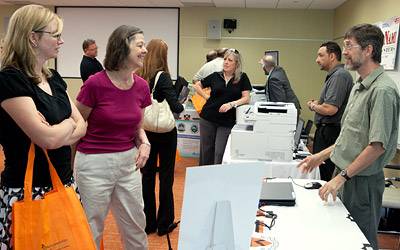
Jennifer Treichler (left) and Janet Upperco, who work in the Office of Finance and Treasury, listen to a presentation by Ted Borer, the University's energy plant manager, during a sustainability fair held at 701 Carnegie Center this June. Staff from the Office of Finance and Treasury, Office of Information Technology, and University Services spent the afternoon learning about sustainable solutions they could adopt in the workplace and in their homes. (Photo by Denise Applewhite)
Representatives from various University offices, as well as local vendors, were on hand promoting ways to reduce, reuse and recycle resources. OIT Hardware Support safely and securely destroyed 73 old computer hard drives, the professional services company Cintas shredded approximately 450 pounds of paper employees brought from home, and Goodwill Industries collected 1,186 pounds of computer equipment and 943 pounds of gently used clothing.
Among other demonstrations, the Facilities Organization provided energy-saving tips, Print and Mail Services displayed sustainable paper products, and SunPower Corp. shared information about the University's Employee Solar Program, which provides benefits to faculty and staff who install solar power systems in their homes.
"Not only did the event showcase what is happening with sustainability here on campus, but it also provided knowledge that staff could take back home to their families," said Daphne Ireland, policy and communication manager in the Office of the Vice President for Finance and Treasurer. "The day helped make the connection that we all have a responsibility to find sustainable solutions where we work and live."
• 'Drink Local' initiative. By installing bottle-filling spouts on water fountains and sinks, the "Drink Local" initiative aims to reduce plastic water bottle waste by encouraging members of the University community to drink filtered tap water. Facilities Organization staff retrofitted approximately 60 existing sinks and water fountains in the residential colleges in 2010, and expanded the effort this summer with 60 more spouts installed in the remaining residence halls, as well as in various academic and administrative buildings.
Weber said the impetus for the program began three years ago when the Office of Sustainability gave reusable water bottles to incoming freshmen, but realized there were not many convenient places on campus for students to fill the bottles.
"Tap water is local, free to the user and has a very low carbon footprint compared to bottled water, but we also want to make sure it tastes good. Every new installation comes with a filter that is changed on a regular schedule," Weber said. "I've seen nothing but enthusiasm for this initiative. In this case, it is clear that simply installing the basic infrastructure and letting people know it's there is enough to adjust habits."
Weber noted the initiative quickly changed practices in two administrative offices in Nassau Hall shortly after bottle-filling spouts were installed, and said she expects the trend will continue across campus.
"The staff decided they no longer needed their five-gallon water coolers, a decision that conserves natural and financial resources," she said.
In addition to retrofitting existing sinks and fountains in residence halls, new hands-free hydration stations have been installed in campus buildings including New South, Frick Chemistry Laboratory and Frist Campus Center. The stations in the Frist Food Gallery and the Frick atrium also have a counter that shows each time they are used how many plastic, disposable water bottles have been saved.
• Energy monitoring dashboards. Features were added this summer to the University's first energy monitoring dashboard in the Frick Chemistry Laboratory, which went live in April, and a second dashboard also was installed in Butler College.
The dashboards were developed by Lucid Design Group and show real-time electric, heating and cooling data, as well as long-term electricity patterns for each facility. They also provide information about the buildings' sustainable features, such as Butler's green roof and Frick's high-efficiency fume hoods, and how they promote energy savings.
"The dashboards help tell the story of a living building. We have models of how we think a new building will operate, but that story often changes once people occupy the space," Weber said. "Our hope is that the dashboards will spur conversations among occupants about how they are using their facilities and perhaps inspire them to adopt behaviors that reduce our impact."
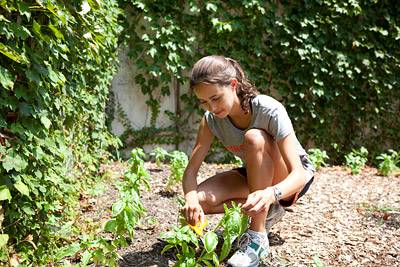
Princeton junior Abigail Hewitt works in the herb garden outside of Frist Campus Center as part of her summer internship maintaining the Frist plot and the Princeton Garden Project on Alexander Road. Dining Services chefs regularly use the campus-grown herbs in dishes at Frist's organic eatery Café Vivian. (Photo by Brian Wilson)
Future plans for the dashboards include adding modules that display the weather, live campus shuttle maps, a campus events calendar and an interactive "green" tour map of campus, as well as features that allow students to download energy data for research projects. In addition, Web-based dashboards where community members can access energy information remotely are being developed.
The dashboards are presented on touchscreen video monitors. The one in Frick is located on the west wall of the atrium; the one in Butler is outside the Class of 1942 Lounge on the lower level of Bogle Hall.
• Frist herb garden. The herb garden outside of Frist flourished again this summer through a partnership between Frist, Dining Services, Grounds and Building Maintenance, the student-run Princeton Garden Project, and the Office of Sustainability. The garden was created last spring in response to a request from Dining Services chefs, who use the campus-grown herbs most often in dishes at Frist's organic eatery Café Vivian.
The garden coordinators, Abigail Hewitt and Lindsey Hornbuckle, maintained the small plot outside of Frist over the summer, while also taking care of the larger garden sites located off Alexander Road.
"Working in the garden was a great way to live a 'greener' life right here at Princeton, and I hope to use this experience to continue an environmentally friendly lifestyle in the future," said Hewitt, a junior.
She said she also hopes to raise awareness among students that the herbs used to flavor some of their food come from right outside Frist's doors.
"I would like to let students know what a huge difference eating local makes," Hewitt said. "By buying or eating products from local farms, not only will their food be more fresh and delicious, but they will help boost the local economy, and they will reduce carbon dioxide emissions by not buying food that comes from across the country or even the world."
• Frist sustainability kiosk. Planning and design for an interactive sustainability kiosk on the 100 level of Frist near Café Vivian moved forward, with hopes to install the display by the end of the fall semester.
Inspired largely by student interest, the Office of Sustainability and the Office of the University Architect have partnered with the architectural firm Matter Architecture Practice and the graphic design company Pure+Applied to develop the project.
"The basic idea is to have a mini sustainability open house all the time," Weber said. "We organize large open houses every two years where campus and local organizations have hands-on sustainability demonstrations. The kiosk will offer administrative, academic and student groups a chance to display year-round what they are doing related to sustainability."
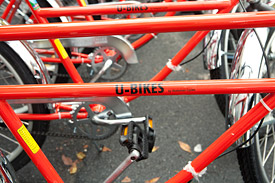
Students returning to Princeton this fall may consider renting a refurbished bicycle from U-Bikes, a student-run effort to repair bicycles left on campus at the end of the year and redistribute them to the campus community. The U-Bikes and CycLab workshop at 130 University Place is one of the stops on the new iPrinceton sustainability tour for smartphones. (Photo by Denise Applewhite)
The kiosk will be a flexible space that can serve many purposes and will include multifunctional display cases; a video screen; demonstration space for rotating exhibits; green tour information; a bulletin board for student groups; and an energy monitoring dashboard that will display energy performance data from various campus buildings.
Weber said organizers have built interest in the project by hosting focus groups to help develop the kiosk, and they have future plans to solicit input to officially name the kiosk. Once it is installed, Weber said she hopes people across campus will be inspired to share what they are doing -- whether small or large -- to aid the University's long-term sustainability goals.
"We really hope it will help forge new relationships with departments we do not typically work with and becomes a resource for the entire University community," she said.
• iPrinceton sustainability tour. Members of the University community and visitors may now take a "green" tour of campus using the new feature on Princeton's mobile application for smartphones. The tour was launched in June by the Office of Sustainability, which continues to add new content and features to the app. The tour is currently available for iPhones, though other platforms are expected to be available in the future.
The self-guided tour allows users to learn about the University's sustainability efforts while visiting sites on campus. Visitors are encouraged to stop outside most locations, though they may access public buildings such as Frist. Tour stops include: Café Vivian, which offers organic, sustainable and local food; Butler College, whose sustainable design features include a green roof and a stormwater cistern that recycles rainwater to irrigate landscaping; the University's energy-efficient cogeneration plant, which helps reduce campus utility usage and carbon dioxide emissions; and the U-Bikes and CycLab workshop at 130 University Place, where student volunteers repair bicycles left on campus at the end of each year and redistribute them to the campus community.
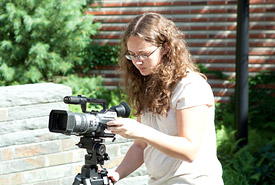
Jessica Santos, a student at Ithaca College, spent the summer at Princeton producing videos for the Office of Sustainability's Student Environmental Communications Network. One of the students' projects was to create a short documentary highlighting work funded by the Princeton High Meadows Foundation, which supports sustainable research, education and civic engagement projects. (Photo by Brian Wilson)
• Student Environmental Communications Network (SECN). For the fourth summer in a row, the Office of Sustainability offered students a chance to learn audio and video production through the exploration of environmental issues.
Two interns, Princeton senior John Votta and Ithaca College student Jessica Santos, filmed and edited multimedia projects with SECN instructor David Benin, a media producer and Ph.D. candidate in the Department of Communication at the University of California-San Diego.
The interns focused on making a short documentary highlighting work funded by the Princeton High Meadows Foundation sustainability fund. The foundation supports sustainable research, education and civic engagement projects that use the campus as a laboratory, such as the Princeton Garden Project and the Princeton Environmental Institute's three-year study tracking the impact of University land use and sustainable practices on the local watershed.
The SECN students also spent the summer filming videos about "green" sites on campus for the iPrinceton sustainability tour.
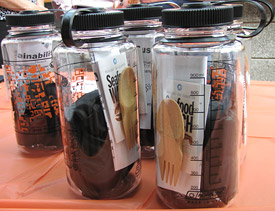
The Sustainability Survival Kit given to incoming freshmen by the Office of Sustainability includes a water bottle, a packable reusable bag and a "spork" made of durable bamboo. (Photo courtesy of Shana Weber)
• Sustainability Survival Kit. As the academic year began, the Office of Sustainability distributed a Sustainability Survival Kit to the Class of 2015 during move-in. For the third year, the office offered freshmen a complimentary water bottle as part of its campuswide Drink Local campaign, encouraging students to use the newly retrofitted fountains and sinks on campus.
This year, the bottle itself became the packaging and included a packable reusable bag featuring a listing of campus retail locations that support reducing the use of plastic bags, as well as all local merchants who have pledged to reduce plastic bag waste through the township and borough's Sustainable Princeton BYOBag campaign. Another novelty item in the kit was a "spork" -- a pocket-size reusable fork-and-spoon combination made of durable bamboo intended to offset the use of disposable plastic utensils.
